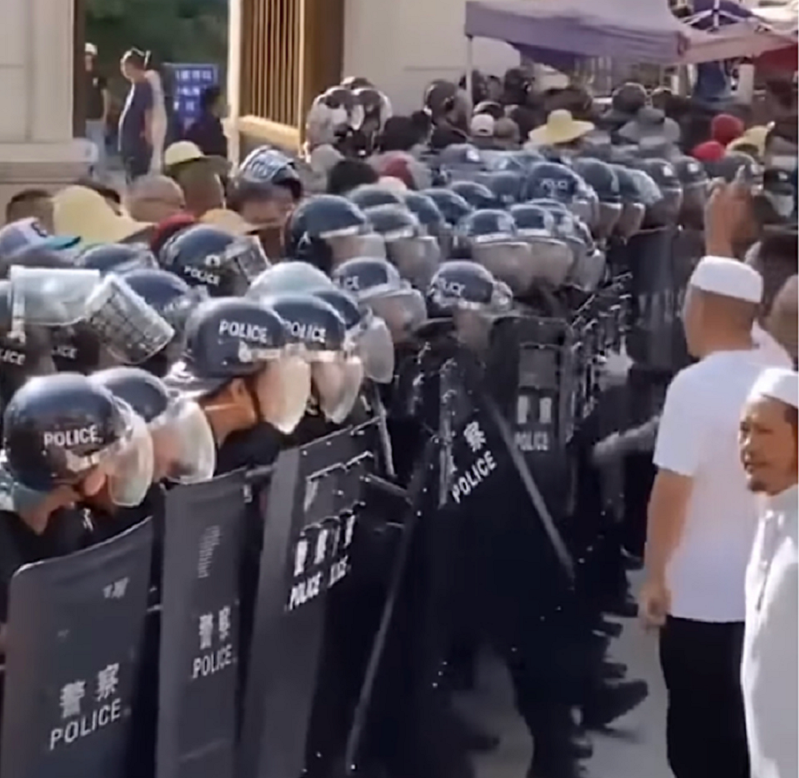Yunnan: the 'sinicisation' of a mosque sparks clashes between police and ethnic Hui
In Tonghai County, the authorities crack down hard on protests against plans to impose a Chinese-style dome to a local mosque. By imposing its symbols, China is tightening its control and censorship over religions. Communications have been cut while a search for "Najiaying Mosque" on Weibo is censored. Muslim shops have been forced to remove Arabic words on their signboards.
Beijing (AsiaNews) – Clashes with law enforcement broke out over the weekend in a city in southwestern China after members of the local Muslim community tried to stop the demolition of the dome of an Arab-style mosque.
The local administration ordered the dome to be rebuilt in a Chinese style, which sparked the angry reaction of the Muslim community. Riot police surrounded the building as local Muslims staged a protest, trying to stop the authorities.
Local sources report that the idea to change the mosque’s look is part of a larger government plan to boost control over religious groups, including Christians, through a policy of “sinicisation”.
Najiaying Mosque, where the clashes occurred, is in Nagu, a city in Tonghai County, Yunnan Province (云南省通海县纳古镇), an area where ethnic Hui Muslims are the majority.
People gathered outside the building last Saturday to try to stop the demolition of the dome, holding sit-ins day and night in an attempt to protect it.
Videos posted online show riot police using shields to block access to the mosque, with protesters throwing rocks and stones at the agents.
Some protesters broke through the barrier and tore down scaffolding, previously installed to allow demolition work.
On Sunday, reinforcement arrived to boost police presence at the mosque, with video footage posted online showing scores of police vehicles parked all around the building.
The Najiaying Mosque dates back to the 13th century, and was originally built in the style of a Chinese temple.
The current building is the result of a renovation done in 2004, when an Arab-style dome and four towers were added. It can hold up to 3,000 people for prayer.
For the local Muslim community, the mosque is an important place of worship; local authorities also consider it important and for this reason want to restore it to its original Chinese style as part of a broader plan of "sinicisation" of places of worship and religions.
According to the Washington Post, the conflict stems from a 2020 court decision that ruled that part of the building's structure was illegal.
As the confrontation continues, local authorities have urged protesters to surrender to police before 6 June to benefit from a lighter punishment.
In the city, telephone calls have gone unanswered, while police reportedly sent vehicles with mobile phone jammer devices to cut off or disrupt communications. Videos and information about the protest have also been censored on Chinese social media.
Searching for "Najiaying Mosque" on Weibo, a Twitter-like Chinese microblogging service, returns no results.
Chinese authorities are promoting a policy of sinicisation in order to strengthen control over religions. Religious groups have been ordered to preach the ideology of the Communist Party of China, including Xi Jinping's thoughts, and include "core socialist values" in their religious doctrines and ethics.
Over the past few years, Beijing has increased its grip on Xinjiang, sending an estimated one million Chinese Muslims, including Uyghurs and Kazakhs, to re-education camps.
Chinese authorities have denied that such camps exist, claiming that people have been sent to schools that provide vocational training and counter (Islamic) extremism.
Outside Xinjiang, sinicisation efforts of Muslim groups have largely gone unnoticed. In the past, ethnic Hui, a Chinese-speaking Muslim group, were more tolerated; however, starting in 2019, they too have been subjected to increased controls.
In Yunnan, Ningxia and Qinghai, home to a sizeable Muslim population, the authorities have imposed a Chinese style of architecture on buildings, removing domes and Islamic symbols such as the star and crescent.
Likewise, Islamic symbols and Arabic lettering have been removed from signboards of Muslim-owned shops across the country.
23/02/2024 11:24
31/07/2023 19:01







.png)










